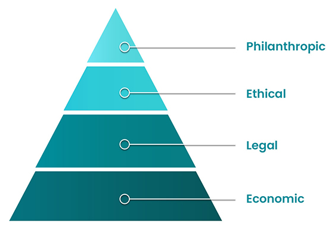[Workplace Culture, Growth, Leadership]
module_1684077620100152
resource-center/the-power-of-purpose
module_1684077620100152
resource-center/the-power-of-purpose
module_1684077620100152
resource-center/the-power-of-purpose
In recent years, customers and employees have become more concerned about the social and environmental impact of the companies they patronize and work with. As a result, socially responsible companies have emerged as industry leaders, attracting customers and employees who value ethical and sustainable practices.
Those with a strong sense of purpose tend to have a clear and defined mission beyond profit-making. They understand they are responsible for contributing to society and positively impacting the world around their spheres of influence. Such companies aim to create a lasting legacy that goes beyond their financial bottom line.
Let’s explore the power of purpose, and how socially responsible companies attract and retain customers and employees.
Defining Corporate Social Responsibility
The definition of CSR can vary. However, it generally includes four main categories referred to as Carroll's Pyramid: philanthropic, ethical, legal, and economic responsibility.

- Philanthropic: dedicating a portion of earnings to charitable giving unrelated to the company's business.
- Ethical: treating all stakeholders fairly, from employees to customers, through responsible sourcing of materials and creating an inclusive work environment.
- Legal: adhering to all applicable laws and regulations and ensure their business operations do not harm society or the environment
- Economic: connecting financial decisions to a company's commitment to doing good.
What Makes a Company Socially Responsible?
A socially responsible company considers the impact of its actions on society, the environment, and the economy. Such companies are committed to positively impacting and creating value beyond profit. Companies that possess this trait focus on four main areas:
Philanthropic responsibility
Relates to a company's commitment to supporting social causes and giving back to the community. This can involve charitable donations, volunteering, or other initiatives that aim to make a positive difference in society.
 Ethical responsibility
Ethical responsibility
Encompasses a company's adherence to ethical business practices, including the treatment of employees, suppliers, and customers. It includes fair labor practices, taking a stand against exploitation or discrimination, and ensuring that products or services are produced and marketed ethically.
Legal responsibility
Socially responsible companies follow the laws, rules, and regulations that are applicable to their operations. They comply with labor laws, environmental regulations, consumer protection laws, and other relevant regulations. They make sure that their business practices do not violate the rights of any individuals, communities, or other stakeholders. They maintain transparency in their dealings, provide accurate information about their activities and performance, and avoid any fraudulent or deceptive practices. By obeying the law, socially responsible companies show their dedication to ethical behavior and their contribution to the improvement of society as a whole.
Economic responsibility
Involves a company's commitment to maintaining financial stability and sustainability while contributing positively to the broader economy. This includes ethical financial practices, responsible investment, and a focus on creating jobs and supporting economic growth.






